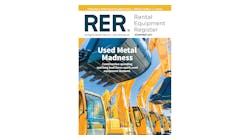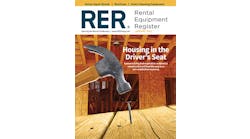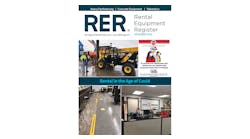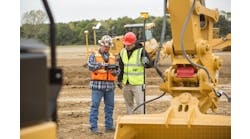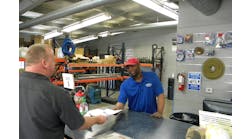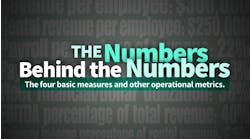Joel Theros looked around at his four branches with nice parking lots filled with shiny brand-new equipment, a top dealer for various brands, with bustling parts counters, shops filled with service work and an organization of more than 100 busy, productive people. He looked at his well-oiled machine that had become a hybrid of full-scale equipment rental and a large dealership and knew his business model was becoming too complicated and difficult to manage.
Theros knew his heart was in rental. He had no problem with coming to work at 5:30 in the morning, being hands-on with everything, doing everything that needs to be done in a rental business — working the counter, calling on customers with salesmen, hooking up machines and doing deliveries. He knew he needed to be making his own decisions at the drop of a hat without having to be concerned about the goals and agendas of manufacturers he was representing. He didn't want to be concerned with manufacturers' warranty rules when his personal and business DNA — forged from growing up around his dad's rental business McLean Rentals — taught him to always figure out a way to help the customer immediately and the most important rules were the Theros rules, which were becoming increasingly divergent from the way a dealership normally operates.
In short, Theros wanted one man to make the final decisions — himself. It's the rental entrepreneurial way and Theros embodied it and knew that was the business model he wanted to follow. Not that Joel Theros is a lone wolf, ricocheting around making rash decisions. On the contrary. He has a solid management team with whom he thinks out decisions carefully, balancing and supporting each other.
“I'm happy that the only person I can blame for my problems is the guy in the mirror,” he says. “I can just talk to him about the problems and fix them.”
Through a life of observing the rental business, growing up in it, working in it from the time he was 12, going off to university and having the opportunity to enter the world of corporate finance and choosing to stick with his father's rental business, Theros, now 39, had figured out his strengths and weaknesses pretty well and had a strong sense of what works and what doesn't in a rental business and how he could use his knowledge and ability to best effect.
“All four of my offices had an overhead structure where I was running parts counters, parts staff, and service personnel and all these people to service the customers as they came in,” says Theros. “The expectation on the part of my customer was that you can stop at any Theros branch and get your parts, get your service, get your rental, and I just found that was not a profitable scenario, there was not enough margin in those parts and new machine sales to justify all that. And rental was beginning to subsidize it, more heavily as time went by.”
Theros began contemplating exiting the dealership business in 2006 to transform the emphasis of Theros Equipment to pure rentals, and by late 2008 he'd pretty well achieved his goal. It turned out to be perfect timing because the equipment sales business was declining by that time, a drop-off that accelerated in 2009.
Theros acknowledges that it may have simply been his own personality that led to the change, just the way he liked to operate, as much as anything the manufacturers did or didn't do. Just the structure of the rental business and the sense of freedom it gives him. But knowing who you are is important in business — if you're not in the right business for you personally, you may not be in the right business.
So how did Theros, who grew up in the rental business, become a dealer? It began with Theros' father, Tod Theros, selling his McLean Rentals to Sunbelt Rentals in 1996 [that acquisition was the key platform that launched Sunbelt Rentals as a national company]. At that time, Theros, who had recently graduated from Wake Forest University, had returned to work full time for the company. Although Theros was weighing an offer to work for a mutual funds firm when he returned in the summer of 1992, he found himself enjoying the business so much he lost interest in the mutual funds opportunity.
After the sale of McLean Rentals, Theros opened Theros Equipment in 1996, but both he and his father were strictly prohibited by a non-compete agreement to engage in rental or anything that was a synonym of that word — thus rent-to-own or rental-purchase agreements were limited.
“We had to just sell equipment,” recalls Theros. “That was it, cash on the barrelhead or financed through a third-party finance company. So we kind of approached the dealership world with a rental mindset because I had never really sold equipment personally up to that point. I had just worked part time and full time at my dad's rental business. We approached sales with the same energy and it worked real well for us. We became a big dealer.”
McLean Rentals, although primarily a rental company, had also been a dealer, selling Mitsubishi and Hino diesel trucks and Toyota, and later Gehl, skid-steer loaders. McLean also took on New Holland, and when the rental side of his father's company was sold in 1996, Joel took over the dealership agreements with New Holland and Gehl under the new name of Theros Equipment.
“There was already a customer base that I could start servicing, there was already a critical mass that I could build on right out of the gate as a result of previous efforts,” says Theros. “So when I started the dealership, I knew I could do it although I didn't really know where it would take us exactly. In '96 it wasn't a certainty that at the end of the non-competition agreement in 2001, that we would go back into rentals. As we got closer to the time, it wasn't that I saw some golden opportunity, or I was timing it correctly, I just liked doing it.”
When the non-compete agreement ended in 2001, Theros began developing the rental side of the business, while continuing dealership activities. The dealership continued to be effective. Theros Equipment was the number one New Holland dealer for several years on both the construction and agricultural side of the business, and the company also took on Kobelco and Mustang rubber track loaders, and all the brands that eventually became Paladin — such as Bradco, McMillen and Sweepster — to complement the New Holland skid steers.
“When the non-competition agreement ended, we kept on selling but we added rental to it,” Theros says. “During the next several years, however, we realized we were a better rental company than we were a dealership.”
A rental personality
Theros found his basic business personality lent itself to rentals and the company culture reflected that. Theros is an active man who rarely sits still for very long. He spends little time in his office, which he mainly uses to park things. He doesn't even have a computer in his office, although he keeps a laptop with him wherever he goes with information on quotes and other important data. Theros' business mentality is conducive to the fast-paced, quick-decision style of rental. If a customer calls with a need for equipment, the Theros staff responds immediately, with a company policy of making every effort to deliver a piece of equipment within two hours of a customer call, or to respond onsite to a breakdown in that same timeframe.
Theros found himself increasingly uncomfortable with the typical dealership approach to customer problems. He didn't like having to deny a warranty request or have to take on the expenses of keeping a customer up and running without participation or reciprocation from the manufacturers. If a machine was broken down, the typical rental company attitude tends to be ‘let's get it fixed right away, or swap it out, let's deal with it immediately and make an immediate decision on what to do.’ Theros is onsite, at work, hands on and if his managers can't make an immediate decision, he can.
“In the rental business there is always a solution, right?” he says. “Oh the backhoe didn't work, we'll make it up to you; we'll get another one out. You can do that in the rental business, you can find a solution the same day. Within hours that customer is back up and running and it's all about uptime. In the dealership world, we found that difficult because manufacturers don't operate that way.”
As signs began developing in 2006 that the economy faced potential difficulties and the fast-paced growth in northern Virginia was likely to slow down, Theros began more seriously entertaining the concept of getting out of the dealership business.
“We could see starting back in 2006 that the dealership was a questionable business for us, and starting in 2006 we shed off some smaller lines that just didn't make any sense; we were wondering why we were carrying them,” Theros says. “As we moved into '07, and finally in '08 we just made a decision that we wanted to get out of the dealership totally and let our rental business breathe because that's what we were good at. In hindsight, wow, that was a lucky move. We wouldn't want to have a bunch of equipment sitting out front that nobody was going to buy right now.”
Theros Equipment maintained good relationships with the manufacturers of the lines it used to carry and still has an agreement to do parts and service business for New Holland. While the rental business has not exactly been gangbusters for the past year or so either, at least it has remained profitable and Theros has been able to make adjustments in fleet size and composition, investing in niche items to enhance rental opportunities while traditional residential and non-residential construction have fallen off the map.
“We bought some personnel carts and some scales for our forklifts to rent to the Washington Convention Center and there's a bunch of smaller convention centers and ballrooms throughout the metro Washington area where they use that sort of stuff and we've had to go in there and market it very hard and try to get some deals,” Theros says. “With all the highway work and infrastructure work going on close to Washington here, we've invested in some more arrow boards and message boards and things like that. We bought a cold planer for a skid-steer to do milling, and that's helped us get some of that business. And we've joined some trade associations pertinent to the people that do asphalt and road work and bridge work to make our faces and names a little more known so we are in the mix when it's time to go price things out.”
Theros added other niche items such as sewer cameras, pipe- and wire-location and detection equipment, and commercial ride-on cleaning equipment, scrubbers and sweepers, and the new items have helped expand the rental business during slow times for more typical commercial construction equipment.
Theros Equipment believes in variety. Its fleet is reflective of a general rental philosophy. Although most of the customer base is contractors, the company is open on Saturday and does a fair bit of homeowner-oriented business, particularly in lawn-and-garden and general repair tools. No single customer represents more than 2 percent of Theros' business. A healthy blend of aerial, earthmoving and general construction equipment is offered. Although for the most part the fleet is composed of mid-sized items, Theros Equipment carries such larger items as 35-metric-ton excavators and 135-foot boomlifts.
Theros believes in keeping it simple. He doesn't go in for a lot of accessories and supplies, believing customers are coming for the reliable renting of equipment. He is confident he won't lose customers because they have to go to Home Depot to buy duct tape. And he doesn't mind referring customers to other rental companies if he doesn't stock something they want, not trying to be all things to all people. He's not afraid to source items from competitors, finding that customers will appreciate his facilitating the deal and won't transfer their loyalty to the provider of that one-time item.
“People really just want their rental representative to take care of them and service them today and they definitely don't want the guy to just say, ‘No, we don't have them, goodbye,’ ” Theros says. “They appreciate the guy who says ‘No we don't have them, but so and so's got them.’ ”
Hands-on owner
Theros works the way he does both to set the example for his staff, keep up relationships with customers and to really know what's going on in the market.
“You have to be part of the daily goings on, and the staff has to feel your presence,” he says. “During the course of a work week my guys will see me, I'm usually working at one of their branches. I'm very infrequently in my office, I'm more typically either standing at their counter or working on a project at their store with them or writing customers' tickets at the front counter. And if I'm not doing that I'm riding with my sales guys, marketing out in the field and getting a feel for the jobsites and who's getting the work and what we need to do to satisfy them. Those actions tend to tell you what you need to do.
“That's the beauty of the rental business; it's a business that's based on just old-school work, just getting things done. Our people and the awareness of that ideal are really what differentiates us. We all know we've got to come in here and work hard today and we know if we do that then everything that needs to get done will probably get done.”
It's the hands-on experience that gives Theros a feel for the business — by working in the field or at the counter, he learns what kind of equipment to buy, and what systems the company has in place are working well, and which aren't because he's using them every day.
“You make daily operational changes and you find out that your policies and procedures aren't as good as you thought and then you fix them,” he says. “I don't sit there and stare at numbers all day and try to burn a hole in the page figuring it out. I just have learned that the numbers will happen if I'm working in the business operationally.”
Theros' hands-on approach also enables the company to adjust rates according to the current situation. When there are a lot of sitting units of a particular category, the company might be more flexible on the rate; when there is a lot of demand and few units available, the company can stand firm for a higher number.
Theros spends between a third and a half of his time in the field, visiting customers, not only marketing, but also handling service issues and talking about problems. “We're talking about everything from what can we do better to serve them because they are happy with us to asking ‘What do you guys rent?’ or ‘If I were to buy one of these, would you rent it?’ ” he says.
Salesmen in the field regularly call Theros with questions about deals. “I get nervous if I don't have that hands-on feel,” Theros says. “You've got to have your nose close enough to the rails that you know what's going on out there so you can make quick judgment calls about whether or not a price is too cheap or whether or not we want to add something to the fleet or just not do a deal. If you don't have that kind of close understanding of the daily goings-on, it would be hard to get through this marketplace. And we've never lost track of the fundamentals of why somebody rents from us.”
The nerve center
One of the main keys to the functionality of Theros Equipment is a large room on the second floor of the Sterling branch — the dispatching control room. Every piece of equipment the company owns is listed on a gigantic white board that literally covers all four walls of the 20-by-38-foot room. Categorized by type of equipment, each unit is listed along with its current status — out on rent (with the name and location of the customer), off rent and awaiting pickup, back from rent and awaiting inspection, in the shop or ready for rent and at which branch. The status is color-coded making it easy for chief dispatcher Ken Croisetiere, assistant dispatcher Stephen Brindley or Theros himself to take a quick look and see what's going on.
Machines aren't assigned to particular branches; the units belong to the company as a whole and float between branches as needed. If an order for a machine comes in, the dispatcher can, at a glance, determine what is available and where and can figure out the most efficient way to schedule delivery. For machines on rent, a date is written next to it that indicates the last time the machine was serviced, enabling staff to determine easily what machines have gone 30 days without servicing so they can immediately arrange for servicing. All trucking is centrally managed for maximum efficiency and cost-effectiveness, avoiding crisscrossing and deadheading.
“We put this in place two years ago and it's helped us out a lot,” says Theros. “Utilization has gone way up and I credit this room for that. I think our central dispatch has helped us stay on top of this fleet. We want to paint the room red, red means it's out on rent.”
In addition to servicing its own fleet and doing parts and service work for New Holland in the region, Theros takes on repair of customer-owned equipment on a regular basis, which has provided an additional revenue stream, welcome in the current economic environment. The extra service work is also helpful during the slower winter months, an important aspect of doing business in a cold-weather climate. Additional revenue sources include the sale of foam-filled tires through the company's parts business.
Theros Equipment is also somewhat unique in preferring to, whenever possible, build its facilities from the ground up rather than purchase and retrofit existing facilities. Theros has done a good bit of building of the facilities himself, sometimes with help from his father, who, apparently, still wields a strong hammer and has the benefit of years of experience in building and retrofitting rental facilities.
Despite the recession, Theros Equipment has done a good job in keeping current with collections, primarily as a result of the efforts of controller Traci Passmore. Passmore's personable nature has helped maintain good relationships with customers. She also excels at designing payment plans to keep customers paying. Joint-check arrangements are a big part of Theros Equipment's approach, typically well-received by customers and far less confrontational than such methods as putting liens on jobs. Passmore is also a strong believer in developing relationships with customers to pre-empt collection issues.
“Any customer with large balances, if we get into a past due scenario, we're normally trying to get a face to face because it definitely brings another level of interaction with that customer,” Passmore says. “When you meet with them, they often realize you're in business just like they are and you're just trying to pay the bills. Then they think ‘These are good people, I don't want them to be the one I don't pay.’ We really try to stay away from collection agencies.”
To the airport
Thinking beyond the current economic morass, Theros Equipment's prospects for the future are strong. The company has a stable staff, with a lot of people with the organization since its inception, including a number of people who worked in the past for Tod Theros' McLean Rentals. Its management team, led by Joel Theros, controller Passmore — who also specializes in heading up the company's marketing efforts — and Keith Noyes, service manager and IT specialist, is secure and solid. Passmore has been with Theros Equipment for nine years and Noyes for 11, after working nine years with McLean in the past.
The company is also in a strong market area in northern Virginia with its locations in Sterling, Warrenton, Lorton and Fredericksburg. Loudon County, where the Sterling branch is located and nearby Stafford County, where the Fredericksburg branch is located, were among the country's fastest-growing areas for years, although they have slumped along with everyplace else recently. The Sterling branch is located in a business park just over the trees from Dulles Airport and the surrounding area is filled with businesses that are involved in airport support services. The airport has a considerable amount of ongoing construction that will be continuing for some time and is likely to provide a good bit of rental activity.
Theros is expecting a flat year in 2010, believing that the economy is “bouncing along the bottom.” The company gives every indication of having done the right things to be prepared to bounce upwards along with the economy when it starts to improve.
To Joel Theros, his approach remains a simple one. “You've got to outhustle your competition, you've got to work harder, get up earlier, get more done in a day, and be part of all the goings-on in the business,” he says. “If you're getting into the rental business to be a passive owner and operator and let somebody else do it all, you're in the wrong business. If you're in the rental business, you're in it because you enjoy getting up and getting equipment to customers all day and if you don't, you shouldn't be in it. Those core principles are really what drive it.”
